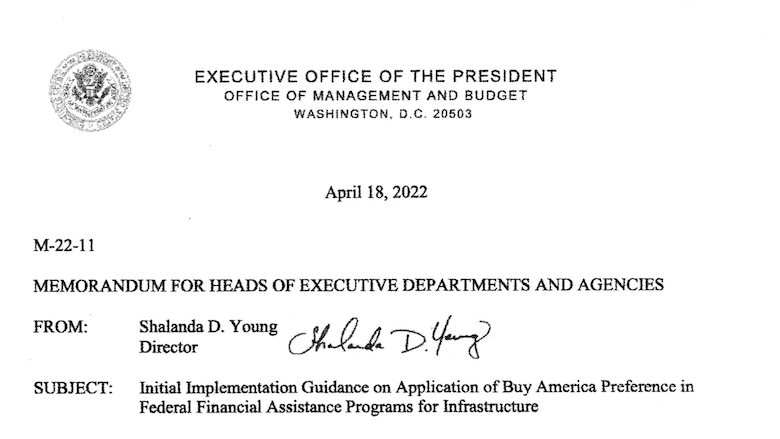Federal Contracting
IIJA Buy America Guidance Draws Flak From AGC

New White House guidance that fleshes out details of Buy America provisions of the Infrastructure Investment and Jobs Act (IIJA) has drawn strong criticism from the Associated General Contractors of America but a positive reaction from U.S. steel organizations.
In an April 18 memorandum to federal department and agency heads, White House Office of Management Director Shalanda D. Young, said, “The act strengthens Made in America laws and will bolster America’s industrial base, protect national security and support high-paying jobs.”
The landmark statute, enacted last Nov. 15, aims to increase use of U.S-produced “iron, steel manufactured products and construction materials” in federally funded infrastructure projects.
Under the guidance, the Buy America provisions will take effect on May 14 and will apply to “all federal financial assistance programs for infrastructure.” More specifically, federal infrastructure contracts issued on or after May 14 must comply with the requirements.
The memo defines a “project” as “any activity related to the construction, alteration, maintenance or repair of infrastructure in the United States.” That wording is somewhat broader than the text of the statute.
The IIJA and memo define “manufactured products” as those that have at least 55% domestic content, measured by their costs.
The IIJA and the new guidance allow waivers from the Buy America requirement under any of three conditions.
One condition is a finding that applying the domestic-content preference “would be inconsistent with the public interest.”
A waiver also could be granted if an agency finds that there are insufficient U.S.-sourced quantities available of types of iron, steel, manufactured products or construction materials.
The third waiver condition is a finding that using U.S. materials would raise the project’s overall cost by more than 25%.
But Stephen E. Sandherr, AGC of America’s chief executive officer, said of the Buy America requirement, “It makes no sense to place unrealistic limitations on firms’ ability to source key materials at a time when prices for those products are skyrocketing and supplies are limited.”
Waiver Provisions
In particular, AGC blasted the memo’s section that deals with waivers, noting that it requires federal agencies to submit waivers to OMB for approval.
Sandherr said, “This is like asking the U.S. Dept. of Education to verify every child’s permission slip to miss a day of school.”
He added, “Whatever minimal gains in domestic construction material production this new mandate might temporarily generate will be offset by the increased cost of constructing new projects, slower schedules to build those projects and the fact that some key projects could be hamstrung from moving forward.”
Brian Turmail, AGC vice president for public affairs and strategic initiatives, said via email that the group would like to see the guidance changed to drop the provision requiring an OMB review of waivers and also to allow waivers “to be approved at the closest level to the project as possible” such as an agency’s district or regional office.
The memo does indicate there will be some flexibility for OMB as it rolls out these policies. The document is titled “Initial Implementation Guidance.”
It also says, “OMB may update or provide additional guidance, as appropriate, to further assist agencies in the implementation of a Buy America preference.”
Steel Industry Groups React
The new guidance received favorable reviews from U.S. steel groups.
Kevin Dempsey, the American Iron and Steel Institute’s president and CEO, noted in a statement that some federal programs do not require Buy America provisions and said, “This announcement is an important first step toward ensuring the fullest possible implementation and enforcement of Buy America domestic procurement preferences by all federal agencies.”
Philip K. Bell, Steel Manufacturers Association president, said in a statement, “This announcement demonstrates the administration’s commitment to ensure that federally funded infrastructure projects are built with steel made by Americans for Americans.”
Bell added, “Clarification and strong enforcement of Buy America domestic procurement preferences will lead to an infrastructure that is made with the cleanest lowest-carbon-intensity steel in the world.”
Michele Stanley, National Stone, Sand & Gravel Association vice president of government and regulatory affairs, said in a statement emailed to ENR that the group was pleased to see that the IIJA specifically excludes from the Buy America requirements “cement and cementitious materials, aggregates such as stone, sand or gravel, or aggregate binding agents or additives” such as asphalt binder.





